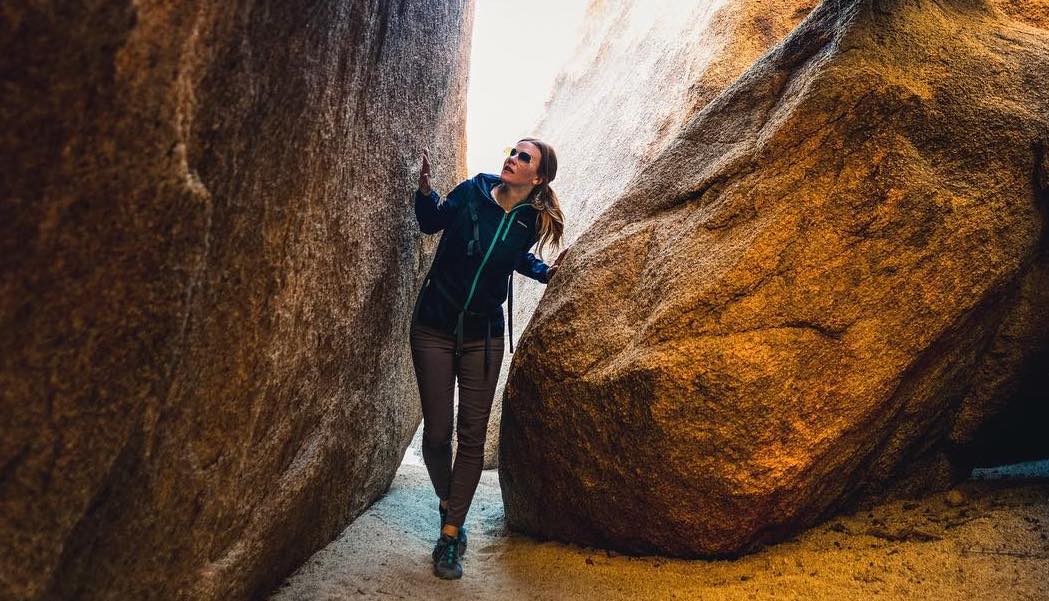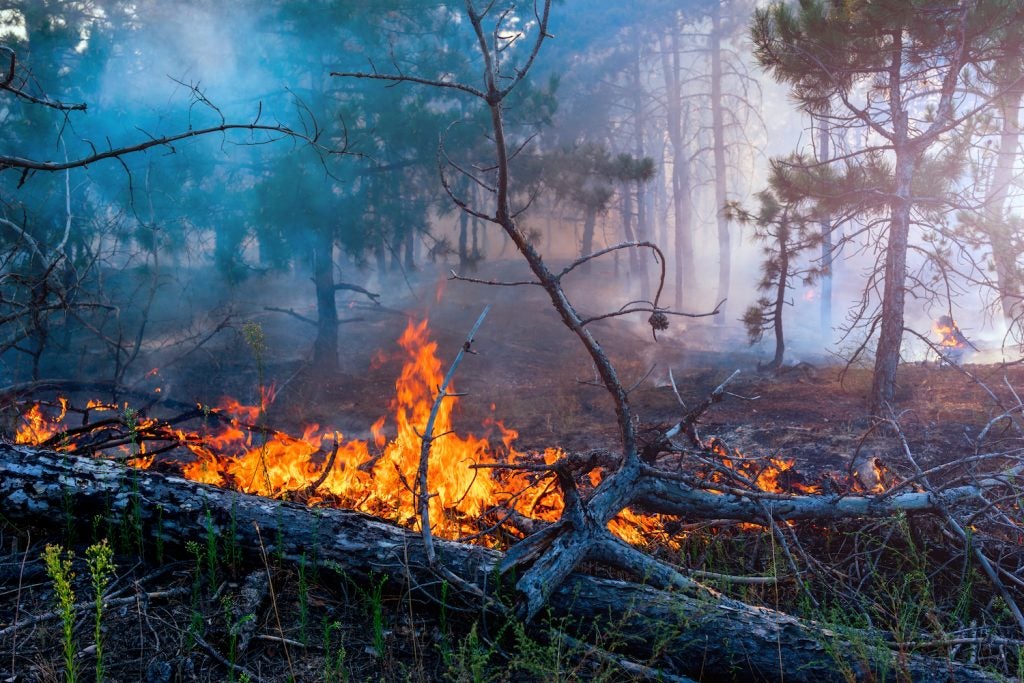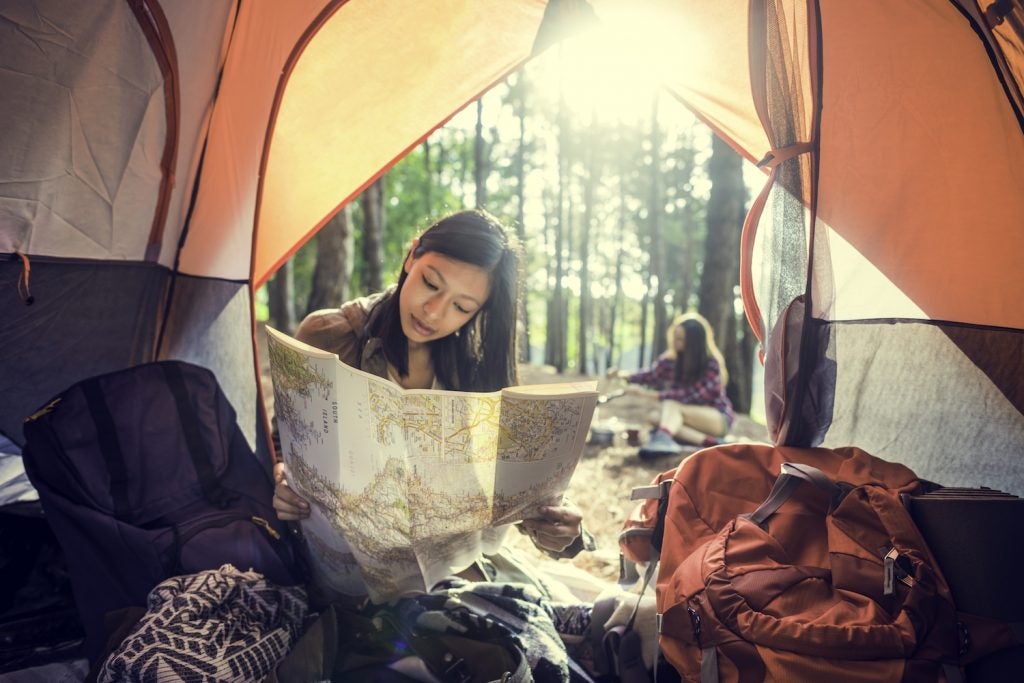Nicole Brown, the cofounder of Women Who Hike, has created an online community of more than 240 thousand people (mostly women) who love to hike and want to hike more. They gather through social media (and in person) to find new friends who hike, to learn about new hiking trails, and to share their experiences.
Through Women Who Hike, Nicole encourages women to form community, to support one another, and to get outdoors. Photos of beautiful places to hike are part of how she does this. In sharing those photos, Nicole has recognized that she can inspire how people treat these places, too. This influence took on new urgency when President Trump ordered a review of U.S. National Monuments last year, and announced the reduction of both Bears Ears National Monument and Grand Staircase-Escalante National Monument
The issues surrounding public lands are complicated, and they overlap with so many other issues, like sustainability, inclusivity, and access to the outdoors. And social media’s effect on all of this is two-fold. On one hand, people are getting out and connecting with nature more than ever. Lots of people like Nicole are inspiring them to do so. On the other hand, the increase in traffic and heavy usage can be detrimental to the environment. We are all treading a thin line between appreciating these spaces and protecting them. So Nicole recently went in search of more education around these issues, both for herself and her online community.
https://www.instagram.com/p/BYQpKkRnERU/?utm_source=ig_embed
The Dyrt caught up with Nicole Brown to discuss public lands issues, why social media platforms like Women Who Hike matter, and how we can all do our part to stay informed and be mindful of the impact we have on our world.
Creating an Outdoor Community Online
The Dyrt: When did your love for hiking and spending time in the outdoors begin?
Nicole: I grew up in Oregon, literally a stone’s throw away from forests, trails and waterfalls, so I’ve always been outdoorsy because its part of my roots. After I moved to Southern California, I started venturing out on weekends when I wasn’t traveling for work and eventually found out that we have some great wilderness areas here too. I’ve actually climbed all of the tallest peaks (10k-11k feet) around Southern California, some of them many times over.
“I think it was something that a lot of people were needing and waiting on, because the success [of Women Who Hike] from the get-go was huge, and we couldn’t keep up.”
Where did the idea for Women Who Hike come from?
I am primarily a solo hiker. I am someone who as an adult moved around and always found it difficult to find and make female friends, so I spent my time on the trails. I started sharing my hikes on social media.
At the time there were a lot of social media accounts featuring women in the outdoors, and I started using their hashtags, hoping to be featured. I started to realize that I was feeding into a culture of competition and these accounts didn’t actually reflect all real women hikers, diversity, or a sense of accomplishment. This is why @womenwhohike was created: to highlight, empower, and unite more women of the trail.
I think it was something that a lot of people were needing and waiting on, because the success [of Women Who Hike] from the get-go was huge, and we couldn’t keep up.
Do you have any tips for how women can support other women getting outdoors more? Or in helping other women to not be intimidated by entering (the outdoor industry/sports) an often male-dominated space?
Definitely. Our Facebook groups are a great resource. If you don’t have Facebook, we also host our own hikes that are led by myself or our ambassador team. There are women who have met on group hikes that have then gone on backpacking trips and even traveled abroad together.
I am also a big believer that empowerment happens through education and preparedness. Get your Wilderness First Aid certification. Take a class. REI now offers women-only classes via Outdoor School and each store has a schedule of what’s going on online, and in taking these classes, you’ll also find people of like mind who also may want to join you on a future adventure.
After founding Women Who Hike, you have gained a sizable public presence. Is there anything that you wish your followers knew or understood more about you?
Women Who Hike isn’t about me. Women Who Hike is a community that is driven by community and that includes all of the women who use our hashtag and our many resources for education, empowerment and finding other women who hike.
Our Facebook groups have been amazing for other women. On any given day or weekend there is something going on all over the U.S. — and now the world — thanks to the women who use these groups for everything from advice on gear, current trail conditions, nutrition and endurance tips and tricks, even wedding photography! Our groups truly encompass all things as they relate to women who hike.
The adventures and friendships that have happened because of Women Who Hike and the women who are a part of our community are truly transcendent and it is a real honor to follow and take part in everyone’s growth.
I said this in a podcast recently, that… I’m not special. I am a woman who hikes and my journey is no more important than anyone else’s and that’s why you’re beginning to see a lot less of me on Women Who Hike, and more from other women who I’ve connected with thanks to our community.
Protecting The Environment & Public Lands
https://www.instagram.com/p/BOgHOpSDu92/?utm_source=ig_embed
Do you think there is a way to appropriately balance our desire to explore and enjoy wild places, while also protecting their wildness?
I do. I think that Leave No Trace principles are a great place to start. Leave No Trace currently has seven principles for how to responsibly explore and enjoy the trails and our wild places.
Unfortunately [these principles aren’t] being done enough. Nearly every campsite we’ve been on in the last four weeks during this trip, we have cleaned up horribly established or illegal campfires, packed out trash from other hikers and campers, and this is in the backcountry!
We can all chip in by doing our part and also spreading the word. Don’t be afraid to speak up on these things when you see someone doing it wrong in person or on social media. We all have to do our part and good stewardship includes spreading the word.
Do you remember a time when you first recognized that wild spaces might need human protection?
So, I come from a conservative background. I’m actually still a registered republican. I know, weird right? Because of this I have always sort of leaned on the belief that the less governing, the better.
But, this current administration has changed all of that. The review of the monuments was shocking to me and in my state of shock came the need to figure things out on my own and dig in deeper past the headlines and talking heads. Because of this I have become increasingly more aware and educated on the facts when it comes to public lands and environmental issues.
Earlier this year I heard a quote from historian Dan Carlin that said, “wisdom requires a flexible mind,” and that is what this last year has been like for me. In doing my own unbiased research, my mind has been changed when it comes to what we should be doing to protect our wilderness and public lands.
“People should care more about what’s happening and what could happen, and that starts with education.”
Is there anything about the current issues public lands are facing that you wish people understood better?
I wish that people understood that “public lands” does not mean public lands forever. There is a lot of clamoring and misinformation going around regarding the monument review and most notably the shrinking of Bears Ears and Grand Staircase. There is a defense that these lands not being monuments means that it will be better managed; that the land will remain public lands and just be returned to the land management, i.e. BLM, NFF.
Sure, that’s true. But I encourage people to look into the amount of lands that were public and have since been sold. Its public record. Some of the things that I have learned on this trip, I can’t reveal just yet. I think it’s easy to see these places online, on social media and want to come see them. But, I am telling you… there is going to come a day where some of these lands won’t be accessible anymore. People should care more about what’s happening and what could happen, and that starts with education.
https://www.instagram.com/p/BjD4-mnjYjc/?utm_source=ig_embed
After visiting and learning more about public lands in the U.S., do you have advice about what we can be doing on an individual level to better serve public lands, and all wild spaces?
I think that before you visit these places you should research them. This is of benefit to yourself and the land in which you’re visiting. There is so much that people are missing out on when they visit a park or other wilderness space. This is definitely something that resonated with me when we visited Bears Ears National Monument. We stopped by the Bears Ears Education Center and got to speak with Josh Ewing from Friends Of Cedar Mesa. Just listening to his words and the enthusiasm that they carried, I knew that we would get to visit Bears Ears with a deeper understanding and appreciation from what we learned having stopped there.
Stopping by a visitor center, ranger station or using even Google to research the history of these places will help in enriching the experience, before, during and after.
“I think if you use these places and want to visit them with respect, you can’t help but find yourself in a position where you want to use your voice and your platform to better inform others.”
What does it mean, to you, to be an advocate for our environment?
That’s a lofty title, and there are so many people doing SO much more than me. People who have been doing it longer and who have dedicated their lives to trying to make a difference.
While I have taken up the action of advocating, I would hardly call myself an advocate. I think if you use these places and want to visit them with respect, you can’t help but find yourself in a position where you want to use your voice and your platform to better inform others. There is strength in numbers and I want to believe that in using my platform for good, people will follow along and also take the opportunity to be more educated — and also take action.
https://www.instagram.com/p/BZqwb4WnKau/?utm_source=ig_embed
Do you have any suggested reading (books, blogs, specific authors) that you think we should all pay more attention to stay current on these topics?
I am a big fan of the She Explores podcast. Since I’m on the road a lot, traveling, driving to trailheads I love getting to hear another woman’s take and experience when it comes to adventuring. I am also a die hard for anything written by Edward Abbey and his take on the outdoors is both intense and funny. I also just started reading everything written by Brendan Leonard (aka @semi_rad) and I appropriately started with The New American Road Trip Mixtape which I started and finished during the first leg of this trip.
You can follow Nicole Brown on Instagram or visit her website. She recently wrote an informative story about her six week trip, which you can check out here. Within this story, she shares some great resources for learning more about the public lands debate. If you want to engage with Women Who Hike, you can check this community out on Instagram, Facebook, or the website.
The Dyrt is the only camping app with all of the public and private campgrounds, RV parks, and free camping locations in the United States. Download now for iOS and Android.Popular Articles:
Articles on The Dyrt Magazine may contain links to affiliate websites. The Dyrt receives an affiliate commission for any purchases made by using such links at no additional cost to you the consumer.



